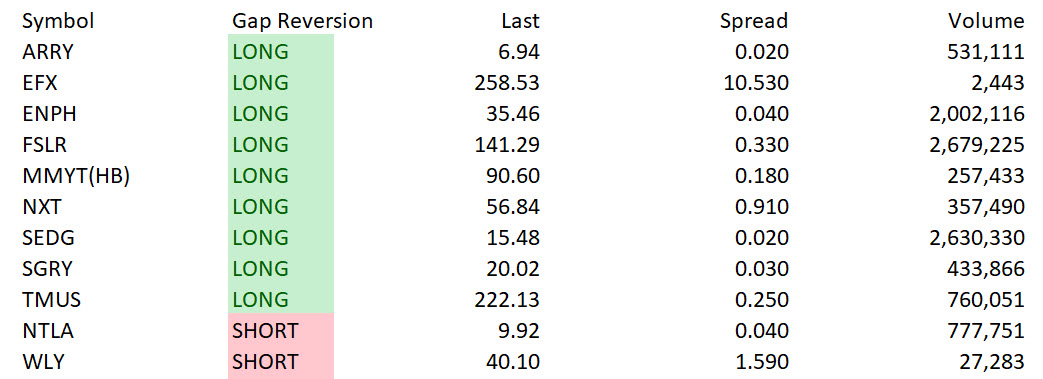The Small Cap Swing Trader Alert Archive
Below you'll find The Small Cap Swing Trader setups stacked up and ordered chronologically.June 20, 2025

June 18, 2025

How an Israel–Iran Conflict Could Impact Markets, Oil, and U.S. Policy
📉 Geopolitical Escalation: Israel–Iran Tensions and Market Fallout
The sudden escalation of hostilities between Israel and Iran—marked by Israeli airstrikes on Iranian military and nuclear sites since June 13—has jolted global markets. Oil markets have led the way, with WTI jumping to around $75–78/barrel and Brent spiking similarly, marking the largest daily surge in months. The CBOE crude-oil volatility index (OVX) surged about 26%, reflecting panic-level pricing.
Energy Markets: Tightening Supply & Uncertain Chokepoints
- Strait of Hormuz risk: As a critical conduit for ~20–30% of global seaborne oil, threats from Iran to disrupt or close the strait have reignited supply fears. Analysts warn this could lead to price spikes of $8–$30/barrel, potentially pushing crude above $100–$150.
- Rising shipping & insurance costs further impair trade efficiency, contributing to persistent price pressure.
Equities & Bonds: Risk-Off Ripples
- Equities have traded lower amid escalating volatility: the Dow fell ~0.7%, S&P ~0.8%, Nasdaq ~0.9%, while the VIX jumped 10–13%.
- Treasuries rallied as investors fled to safety, pushing the 10‑year yield down toward 4.4%.
- Retail sales weakness in May added to vulnerability, strengthening the risk‑off tone.
🧭 Economic Outlook: Growth, Inflation & Policy Implications
Short-term pain for global growth: Persistent high oil prices act as a geo‑inflationary tax, squeezing consumer spending and potentially ratcheting up inflation—adding complexity to the Federal Reserve’s policy stance. RBC analysts warn of a possible 20% S&P drawdown if conflict drags on.
Historical precedent: Past Middle Eastern conflicts (1973, 1979, 1990s) triggered sharp dislocations—energy gains, equity dips, bond rallies—but were often short-lived once contained.
Natural safe-haven tilt: Gold, the U.S. dollar, and defensive sectors like utilities, energy, and national defense have outperformed, while cyclical sectors lag.
⚠️ Scenario 2: What If the U.S. Gets Involved?
If the United States becomes militarily involved—via airstrikes, naval operations, or strategic support—the global market implications could deepen dramatically:
- Wider equity sell-off: Broader risk-off sentiment would likely accelerate losses across global stock markets.
- Oil risk amplified: Any U.S. presence in the Gulf could heighten disruption risk, pushing crude prices past $100.
- Complex Fed outlook: Inflationary oil pressures may force the Fed to walk a tighter line between rate cuts and inflation containment.
- Flight to safety intensifies: Expect a surge in demand for gold, the dollar, and Treasuries.
- Volatility spikes: With conflict escalation, the S&P could drop into the 4,800–5,200 range under worst-case RBC projections.
For more, read Trump weighs Iran strike, demands surrender vs Israel
🧠 Key Takeaways for TraderInsight Readers
| Theme | Insight |
|---|---|
| Energy volatility likely continues | Oil near $75–$100+; trading tight depending on Strait stability |
| Markets in defensive mode | Bonds, dollar, gold, and defense/energy equities gain; cyclicals under pressure |
| Monitor key triggers | Any Iranian move on Gulf energy, U.S. military assistance, or strait disruption |
| Policy balance is critical | The Fed will need nuanced communication to address inflation versus growth |
| Active risk management is essential | Think hedged positions, tight stops, and rotated exposure |
When conflict risks rise, so does market turbulence. But history shows that once clarity—or containment—emerges, markets resume their previous paths. The challenge lies in navigating volatility today without abandoning strategic conviction.
June 17, 2025

Traderinsight Website Tour
June 11, 2025


